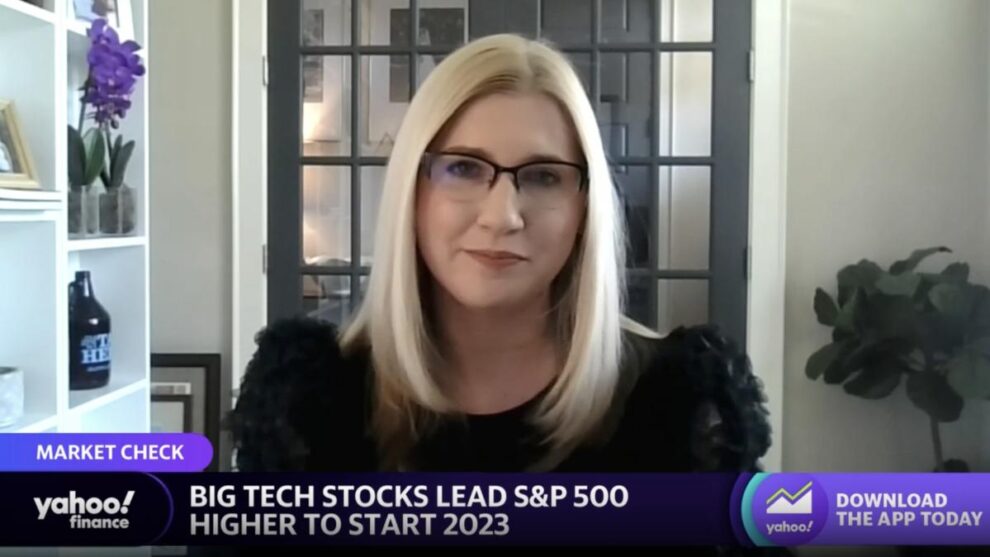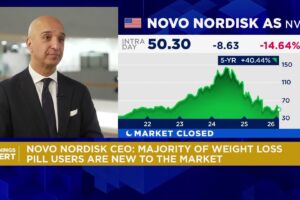Callie Cox, eToro USA Investment Analyst, joins Yahoo Finance Live to discuss the tech market and the job security of retail investors despite inflation, workforce woes, and Fed rate hikes.
Video Transcript
DAVE BRIGGS: Several big tech stocks rising today– names like Apple, Alphabet, and other big tech stocks that formerly made up the FAANG group are having their best month against the rest of the S&P since July 2011. Here to talk more about the outperformance is Callie Cox, Etoro USA Investment Analyst. Nice to see you, Callie. So is big tech now defensive?
CALLIE COX: It seems so. You know, big tech for so long was thought of as this growth stock kind of group. And honestly, it fit the profile pretty well. But now that investors are looking for safety and they’re looking for quality within the stock market, they’re looking for those healthy profit margins, those strong cash hoards, and durable balance sheets. It seems like they’re giving an eye toward big tech and turning away from those smaller speculative tech companies.
SEANA SMITH: So, Callie, is the bull market that we are seeing play out in tech, is that just beginning?
CALLIE COX: It’s a good question. And I think it depends a lot on what we see from the economy and the Fed’s response. There are a lot of balls up in the air right now. I know you mentioned earlier that we had some Fed speakers saying that the Fed could hike rates even more.
And I think that just speaks to the fact that inflation in this moment has not been controlled. And that’s a big headwind for tech at the moment. But again, when rates are high and operating costs are rising quickly, then as an investor, it does behoove you to look more into quality.
And that can benefit big tech. Again, it just may not benefit the entire tech sector because there are a lot of solutions out there.
DAVE BRIGGS: Do you anticipate another 25 point hike in the next meeting? And how might that impact this shift to tech?
CALLIE COX: You know, I think it would make sense for the Fed to pause here. It’s definitely a rock and a hard place for the Fed at the moment, but going by what they know, inflation is still quite high. And if they pause, they can keep rates high and see how the effects move throughout the economy and then respond as needed.
But I think with the banking situation where it is right now, certainly could be a risk to growth. But it’s too early to tell. It may make sense for the fed to pause. Although who knows, they’ve surprised us before.
SEANA SMITH: Callie, you have new data on your retail investors from Q1. How are they positioned? How exposed have they been to the recent turmoil in the banking sector?
CALLIE COX: So retail investors have been resilient for quarters now. They are getting a little more pessimistic. Even though they’re diversifying, they’re not necessarily selling out of the market. But they are getting a little more pessimistic about the economy and about the state of the US markets.
And to counter that, they’re going global. They’re looking at global opportunities. They’re looking at other asset classes. They’re raising some cash not because they have to, but because they see opportunities in the market ahead of them and they want to have enough dry powder on the sidelines there.
But they are– one risk that we’re watching is that they are quite exposed to this banking crisis. Of course, many Americans have a savings account, but financials are actually the second most held sector among US retail investors we surveyed, which is a worrying fact considering they got hit so hard this month.
DAVE BRIGGS: Also part of that data shows the holdings of crypto, which one might expect in this environment, and given the crisis we’ve seen there with some banks, investors fleeing that space– not exactly what the data is telling you. Why do you think that is?
CALLIE COX: Yeah, so it’s really wild. We did the survey every quarter of 10,000 global investors. And even though crypto had such a rough year last year, allocations barely changed. Retail investors’ allocations barely changed. They went from about 29% in Q1 of last year to 26% of their entire portfolio this quarter.
And what that shows me is that there’s a lot of hodling going on. There’s a lot of holding on because we do have a lot of long term investors in crypto at the moment, especially with so much speculation being washed out. And they may not feel emboldened enough to trade or speculate a little bit more, but they believe enough in the power of the technology and in the decentralized properties, which is a big feature these days, to hold on and see where it goes.
SEANA SMITH: So, Callie, that’s how the retail investor has been positioned through Q1. How should they, then, be positioned for the remainder of the year?
CALLIE COX: Well, we’re turning cautious here. We put this out about a month ago, but we got a little cautious once the S&P crossed 4,000 before the banking crisis and it seemed like inflation wasn’t coming under control as quickly as we thought. So right now, with the banking fears definitely top of mind and growth potentially slowing, we’re encouraging customers to think about how they can turn defensive but hold on to a little risk as well. And I think that comes back to quality. It comes back to the companies that you’re investing in, knowing why you’re invested in them and how they make money.
DAVE BRIGGS: But you also got some data on job security. And what did you find out in that regard?
CALLIE COX: So this was another interesting part of the survey we did. So we asked retail investors how confident they feel about a number of things– the economy, their living standards, their job security, their investments. And we got a few interesting tidbits this time around, but the one that jumped out to me is just how confident investors are in their job security.
And it makes a lot of sense. You look at the job market and it’s still incredibly strong. It’s one of the reasons why the Fed is still feeling inclined to hike here, because it’s a bit out of balance. But for me, for the Fed to cut rates to be worried about a recession, we really need to see some evidence of breaking down within the job market.
Obviously, I don’t want that to happen. Best case scenario is the Fed can get inflation down without roiling the job market. But for now, that’s where I’m looking when I think about where markets could go from here.
SEANA SMITH: Callie, do you think you’ll see any sign of that in next week’s report?
CALLIE COX: I think it’s too early to tell if you think that the banking headlines could cause some growth scare. I really do think it’s too early to tell. Layoffs are still quite low. We may see some tightening credit standards, but that could take some time to work through the economy. I don’t see any indication that hiring has slowed down, but that doesn’t mean the trend can’t change over the next few months.
SEANA SMITH: Callie Cox, always great to hear from you. Thanks so much.









